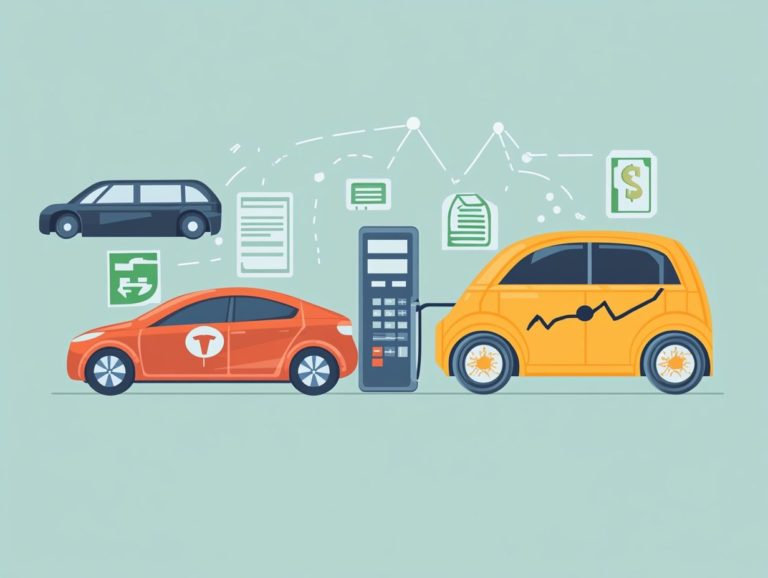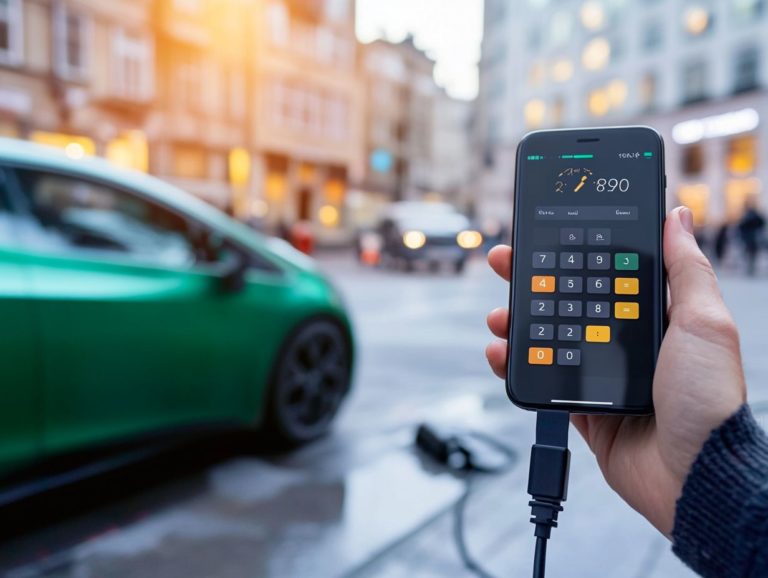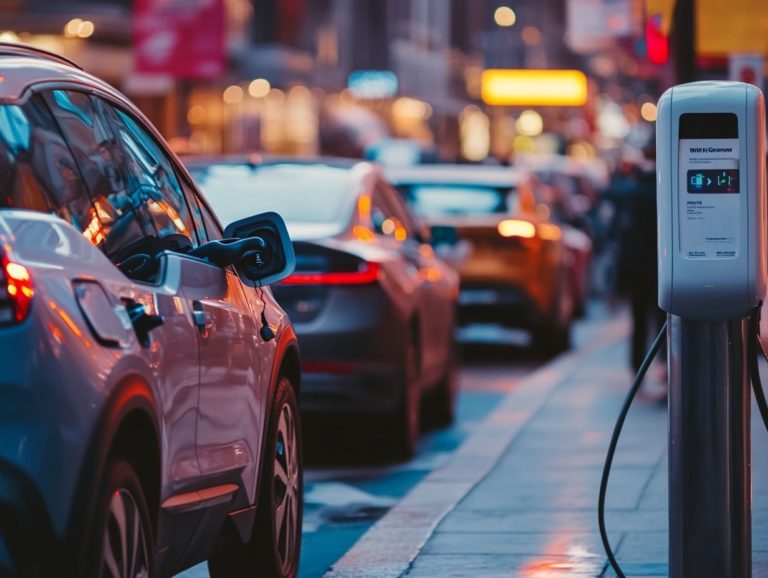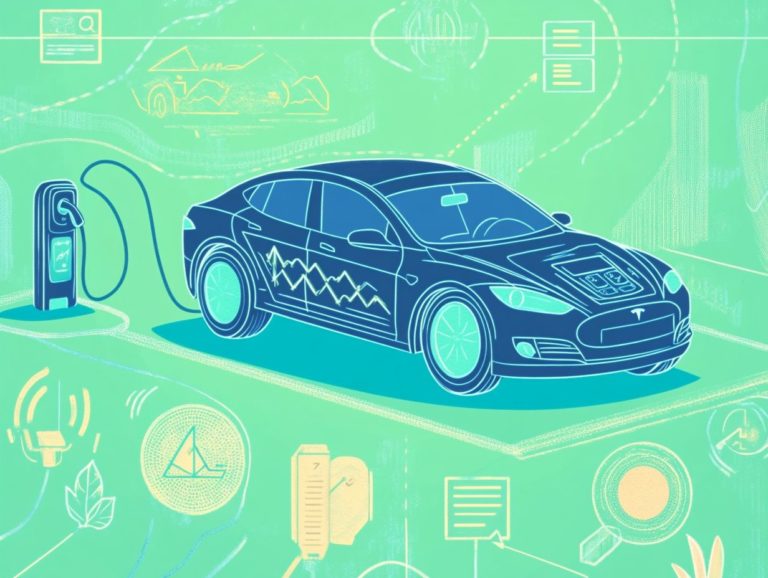understanding the process for ev rebates
Electric vehicle (EV) rebates present a remarkable opportunity to substantially lower the costs associated with transitioning to sustainable transportation. This makes it more accessible for both individuals and businesses to adopt eco-friendly practices.
This comprehensive guide encompasses all the essential information regarding EV rebates. You’ll find details about eligibility criteria, the application process, and various types available, such as government and manufacturer incentives.
Delve into the advantages these rebates offer while also dispelling prevalent myths. Discover how you can leverage these financial incentives to benefit your wallet and contribute to a healthier planet!
Contents
- Key Takeaways:
- Eligibility for EV Rebates
- How to Apply for EV Rebates
- Step-by-Step Process
- Types of EV Rebates
- Benefits of EV Rebates
- Common Misconceptions about EV Rebates
- Frequently Asked Questions
- What are electric vehicle rebates and why should I care?
- How do I know if I am eligible for an electric vehicle rebate?
- What is the process for claiming an electric vehicle rebate?
- How long does it take to receive an electric vehicle rebate?
- Are there any limitations or restrictions with electric vehicle rebates?
- Can I combine electric vehicle rebates with other incentives or discounts?
Key Takeaways:

EV rebates are financial incentives offered by governments and manufacturers to promote the adoption of electric vehicles. To qualify, you’ll need to meet certain requirements, such as income limits and vehicle type. Additionally, understanding the tax benefits for EV owners can further enhance your savings. The application process involves submitting documentation and waiting for approval.
What are EV Rebates?
EV rebates are financial incentives designed for you when you purchase electric vehicles (EVs) or plug-in hybrid vehicles. These incentives encourage your transition to clean vehicles, helping to reduce carbon emissions and promote sustainability.
By taking advantage of these rebates, you can significantly lower the overall purchase price of an electric car. This makes it more affordable while contributing to environmental goals supported by federal initiatives like the Inflation Reduction Act.
The aim of these incentives is to stimulate market demand for EVs by easing the financial burden you might face as a buyer. The amount of EV rebates can vary depending on the make and model of the vehicle. Some states and local governments also offer additional perks.
To qualify for these rebates, you’ll typically need to meet specific criteria set forth by local and federal regulations. This may include income limits or residency requirements. The IRS plays a key role in determining your eligibility and guiding you through the various programs available.
These incentives are your ticket to a cleaner future! They encourage you to make more sustainable choices, ultimately shaping a cleaner, greener world for all.
Eligibility for EV Rebates
To qualify for EV rebates, you must meet specific eligibility criteria. These are often determined by factors like a specific calculation of your income used by the IRS and the particular electric vehicle model you choose.
This approach ensures that tax incentives are tailored to benefit those who stand to gain the most from them.
Requirements and Qualifications
The requirements for receiving EV rebates can vary widely but generally hinge on your purchase of a qualified electric vehicle that aligns with IRS guidelines. You’ll also need to provide documentation during tax filing to verify your eligibility.
To master the application process, gather essential documents such as:
- Proof of income
- The vehicle identification number (VIN)
- Purchase receipts for your electric vehicle
This documentation is vital, as it substantiates your claim for the rebate. It’s advisable to file your claims promptly within the designated tax period to avoid processing delays.
Tools like TurboTax can help you navigate the intricate landscape of the tax code, ensuring that you meet all necessary requirements. They offer worksheets and prompts designed to streamline the documentation process, making the experience more straightforward and less daunting.
How to Apply for EV Rebates

Applying for EV rebates requires a systematic approach. Start by understanding the process, which typically begins with purchasing an eligible electric vehicle from a participating dealership. For more details on this, check out what you need to know about EV purchase rebates.
Your journey culminates in the precise filing of tax forms with the IRS. Are you ready to explore how EV rebates can save you money? Don t miss out on these savings!
Step-by-Step Process
The journey to applying for EV rebates begins with understanding eligible electric vehicles and the tax incentives available under the Inflation Reduction Act. To find out more about what the eligibility requirements for EV rebates are, as this knowledge can significantly lighten the financial load of purchasing a clean vehicle.
Once you’ve found the right model, engage with various dealerships to check availability and pricing. Evaluating different offers and negotiating when possible can lead to valuable savings, so don’t hesitate to negotiate.
After securing your purchase, gather essential documentation, such as the bill of sale and any financing agreements. With these documents ready, meticulously complete the required IRS forms, which are the official forms needed for tax credits. Ensure every detail is precise to avoid future tax penalties.
Remember to double-check your entries; even a minor oversight can lead to costly complications down the line.
Types of EV Rebates
You ll find two primary types of EV rebates available to consumers:
- Government-sponsored rebates, typically funded at the federal level through initiatives such as the Inflation Reduction Act.
- Manufacturer rebates, which are directly offered by car companies as part of their sales strategy.
Government vs. Manufacturer Rebates
Government rebates for electric vehicles (EVs) aim to promote the use of clean vehicles through tax incentives. In contrast, manufacturer rebates serve as promotional offers to entice you into choosing specific electric models over traditional vehicles.
These two types of incentives have unique advantages and challenges:
- Government rebates, like the federal tax credit for electric vehicles, can substantially reduce your overall tax liability, allowing you to save a notable sum when tax season arrives. However, these rebates often come with eligibility requirements that may limit access for some buyers.
- Manufacturer rebates provide direct discounts on the vehicle’s purchase price, making specific models financially appealing in the short term without the hassle of tax paperwork.
A prime example of a government initiative is California’s Clean Vehicle Rebate Project, which complements Tesla’s direct cash-off promotions and enhances Tesla’s competitive edge in the market.
While both rebate types aim to encourage EV adoption, understanding their impact on the total cost of ownership can help you make informed decisions.
Benefits of EV Rebates

EV rebates offer exciting benefits that go beyond just saving money.
They play a crucial role in fostering substantial environmental benefits, leading to cleaner air and a reduction in greenhouse gas emissions.
These incentives also provide significant financial motivation to transition to electric vehicles.
Financial Incentives and Environmental Impact
Financial incentives through EV rebates not only enhance the accessibility of electric vehicles but also play a vital role in reducing environmental impact by encouraging the adoption of cleaner technologies.
These financial tools actively motivate you to transition from traditional gasoline-powered cars to electric vehicles, leading to a significant reduction in greenhouse gas emissions.
A study from the International Council on Clean Transportation suggests that increased EV adoption could potentially halve emissions by 2030 compared to a business-as-usual scenario.
Moreover, a survey indicated that many consumers found rebates and tax credits made owning an electric vehicle much more attractive, ultimately influencing their purchasing decisions.
As automakers expand their electric offerings, these financial incentives lower upfront costs and align your choices with a more sustainable future.
Common Misconceptions about EV Rebates
Several prevalent misconceptions about EV rebates can easily mislead consumers.
For instance, many people believe that all electric vehicles automatically qualify for these incentives or that the rebates are guaranteed. Such misunderstandings can lead to confusion and even potential penalties when it comes time to file taxes.
Debunking Myths and Clarifying Information
Understanding the myths surrounding electric vehicle (EV) rebates is essential for maximizing your benefits and avoiding common pitfalls. For detailed insights, check out what to know about rebates for charging stations; accurate information on eligibility and application processes is crucial.
Many individuals mistakenly believe that all electric vehicles automatically qualify for rebates. However, this is often not the case. Some models may not meet the criteria set by organizations like the IRS or reliable sources such as NerdWallet.
Furthermore, many people think rebates can be applied retroactively to vehicles they’ve already purchased. Typically, this is not true most rebates must be claimed at the time of purchase.
Clarifying these points will help you make informed decisions as a potential EV buyer, while also promoting the adoption of environmentally-friendly technology. By ensuring you receive the financial support intended for you, you’re not just making a savvy choice; you’re contributing to a greener future.
Frequently Asked Questions

What are electric vehicle rebates and why should I care?
Electric vehicle rebates are financial incentives offered by governments or utility companies to encourage the adoption of electric vehicles. These rebates can significantly reduce the cost of purchasing an electric vehicle and make them more affordable for consumers. If you’re considering purchasing an electric vehicle, understanding the rebate process can save you money.
How do I know if I am eligible for an electric vehicle rebate?
Eligibility for electric vehicle rebates varies based on your location and the specific program. Generally, you must be a resident of the state or country offering the rebate, and your electric vehicle must meet certain criteria, such as battery size and range. Some programs may also have income restrictions, making it essential to research the requirements for your area.
What is the process for claiming an electric vehicle rebate?
The process for claiming an electric vehicle rebate differs depending on the program. Typically, you will need to fill out an application and provide proof of purchase or lease of an eligible electric vehicle. Some programs may require additional documentation, such as proof of residency or income. Once your application is approved, you will receive the rebate via check or direct deposit.
How long does it take to receive an electric vehicle rebate?
The timeline for receiving an electric vehicle rebate varies among programs. In some cases, you might receive the rebate immediately after your application is approved; in others, it may take several weeks or months to process. It’s vital to research each program’s timeline and plan accordingly, as some rebates might have expiration dates.
Are there any limitations or restrictions with electric vehicle rebates?
Yes, there may be limitations or restrictions associated with electric vehicle rebates. For instance, some programs may only offer rebates for specific models or brands of electric vehicles. Others may limit the number of available rebates, so it’s crucial to apply as soon as possible. There may also be restrictions on how the rebate can be used, such as only towards the purchase or lease of an electric vehicle.
Can I combine electric vehicle rebates with other incentives or discounts?
In some cases, you may combine electric vehicle rebates with other incentives or discounts, such as federal tax credits or manufacturer discounts. However, it’s important to research the rules and regulations of each program to determine which incentives can be combined. Additionally, some programs may have specific requirements or limitations for combining incentives, so be sure to read the fine print carefully.






